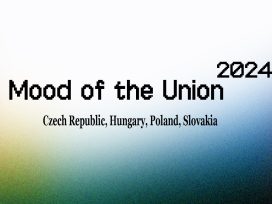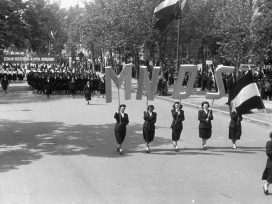“How much foreign currency are you carrying?” asked a customs officer, pulling me out of the queue. It was August 1990 and my younger brother and I were at Ferihegy airport in Budapest headed for London. Presumably the customs manual noted long scraggly hair and dirty denim jackets among the typical features of currency smugglers. Denials were in vain; our pockets soon revealed cash far in excess of the permitted amount (anything above 20 euros needed a special OK). Start with my brother, I pleaded; I’d hitchhike there in two days if this palaver forced me to miss the flight. The guards got around to me 25 minutes later and asked a few questions before making me sign a document testifying to the confiscation of foreign bank notes which my father and aunt – working and living in London and Hamburg respectively – had allegedly given me. A minibus rushed me to the plane and the stairway was towed back to the already locked rear door. At any rate, I found myself sitting on the plane next to my terrified brother who had been figuring out in the meantime how to make his way from Heathrow to our father’s flat in southeast London. We spent the rest of the flight discussing how our parents might react. (After initial dismay, they burst out laughing and reimbursed our lost cash.) My mother may have remembered an incident in 1975 when she travelled to Kosice, Czechoslovakia, on business. She had accidentally left her bank deposit book in her bag before leaving home, and was later prosecuted for her wickedness. Just as she eventually got most of her money back, I was reimbursed later at the customs office in Budapest. My offence got me entered into the criminal records, though I was pardoned when the crime was deleted from the Criminal Code.
I was reminded of all this a few years later while reading Imre Kertész’s newly published novella Sworn Statement. In 1991, Kertész recounts Hungarian customs officers had ordered him to get off an express train bound for Vienna at Hegyeshalom for the same offence. Kertész saw more than an act of humiliation here, and it turned into an allegory about the relativity of freedom. Kertész implies that it takes longer to change the relationship between state and citizen than it takes to change the political system. Euphoria over the change of system had dimmed by then. At the same time, the sense of being a free man and pride of citizenship were not yet ingrained in people’s consciousness. Evidently, the boneheaded customs officers’ insistence on pointless rules had activated in Kertész his acute sense of the vulnerability of an eastern European subject.
As I read Kertész, I wondered why at the airport I hadn’t felt the same sense of humiliation (ludicrous though the whole thing was). True, I was twenty back then and far more interested in girls and travel than politics. Still, how is it that I had sensed nothing of the significance of the blurring of the divide between imprisonment and freedom? My mother had gazed in astonishment at my generation’s nonchalant grabbing-hold of passports and starting-off into the wide world. She was amazed at what we took for granted: going wherever we liked for as long as we could afford. Any obstacles along the way were, as far as we were concerned, anomalies; we certainly didn’t suspect that only appearances had changed.
Ferihegy was not my first border adventure. During a high school spring break in 1988, my girlfriend and I travelled to Sopron, a town near the Austrian border, to taste the local wines and at last spend a long unsupervised weekend together. Incidentally, Sopron is known as the city of loyalty because of the 1921 referendum when they chose Hungary and the whole country took them to its bosom (though their descendants, in the years of socialism, were not convinced of the wisdom of the decision). We were travelling on a domestic intercity train, but a border guard got on anyway and asked us about the purpose of our journey, aggressively warning us that we should not even think of fleeing to Austria because we would be caught and then we would be in a lot of trouble. We could hardly contain our laughter.
Nevertheless, I must have suffered a mild form of post-party-state trauma: before we went to Venice recently, my wife, well aware that our identity cards were enough to enter Italy, firmly decided to leave her passport at home. When it was our turn at Treviso Airport, the border policewoman hesitated for a moment. After studying both sides of the plastic card – I was about to reach into my pocket for my wife’s passport which I had secreted there – the officer produced a laminated document, located the Hungarian identity card on the list, and shepherded us on smilingly. I was surprised and relieved, but my wife apparently did not think for a moment there might be a problem. In a few weeks’ time, we are going skiing in the French Alps with some friends. I have already started to convince myself that a passport won’t be necessary, but for the time being I think I will eventually end up slipping it in my inside pocket.
Hungary and eight other EU member states joined the Schengen zone on 21 December 2007, which means we now stand a good chance of being able to travel as far as Portugal with our identity cards without being stopped by border guards. True, we have to slow down a little at Hegyeshalom until the gates are demolished at the old border crossing station, but this shouldn’t take more than a few months. The opening of the borders was not celebrated with such euphoria as the decision to allow East German tourists to cross into Austria in 1989. For a long time, passport control has been a mere formality; if you had as many EU passports as people in the car, the guards would wave you through without any further ado.
Austrian border guards, with their eye for detail, may have noticed that the stickers on at least one-in-five Hungarian cars (according to my non-representative survey) show a country with a shape totally unlike that of the Hungary in official documents. The weird-shaped formation is historical Hungary as it used to be before the Treaty of Trianon. The use of these stickers shows that, to this day, millions of Hungarians are unable to accept the fact that treaties between the major powers after the First and Second World Wars saw two thirds of Hungary’s territories annexed to neighbouring countries with a better sense of diplomacy.
Here I could cite numerous reasons for such defiance, including the blows and traumas Hungarians have suffered throughout their history and the fact that we failed to face our past during the 40 years we spent as a Soviet satellite state; and I could contrast all that with the beneficial effects of the social dialogue in Germany concerning the Nazi and Communist past. I could also recall the famous Pan-European Picnic in September 1989, when Foreign Minister Gyula Horn (Prime Minister from 1994 to 98) tore the iron curtain to pieces all by himself, at least in his own opinion, to let hundreds of Eastern Germans across. It was indeed a giant leap for mankind, but too big a step for one man – even ten years later as a democratically elected prime minister, Horn failed to apologise for his actions as a member of the special political police in 1956. However, all that would lead us far from the subject of the opening of the Schengen borders.
Today, only extreme right-wingers dispute the fact that Hungary’s borders can no longer be redrawn. Nonetheless, there are still some conservative families in Hungary who – at least as part of the rhetoric of Sunday family lunches – declare that they will not travel to Transylvania and the former Northern Hungary while they need a passport and to change money to do so. What that originally meant was: until they once again become part of Hungary. However, the criteria may also be interpreted in narrower terms. For example, Hungarians had been able to travel to Slovakia without a passport for a long time before the border control was eliminated altogether. A few years down the line we might even have a common currency, the euro (although they may introduce it much sooner than us), which means that there will be tens of thousands more Hungarian holidaymakers. Transylvania is a tougher nut; Romania’s accession to the EU in January 2007, however, means that prospects are encouraging.
The borders drawn at Trianon have had the most absurd and tragic effect in small regions. In some villages along the Slovak-Hungarian border, inhabitants had for decades been forced to travel 50 kilometres to the nearest border crossing station whenever they wanted to hug family members or friends living just 20 metres away. The small border crossing stations that were opened over the last few years have made the lives of these people, as well as people who like visiting shops and pubs in neighbouring villages, much more convenient. However, the new state of affairs after the introduction of easy border-crossing options did not lack absurdity either. Cered, a village in Hungary, is found only a few hundred metres from Tajti (Tachty) in Slovakia. In summer 2006, a paved road was built between the villages; but the border was only opened for excursionists, which meant that while pedestrians and cyclists were allowed to cross cars were not. In a bid to enforce this rule, Hungarian border guards agreed to saw off a metre and a half of the barriers to help cyclists cross without difficulty.
However it quickly transpired that you cannot just go and saw off pieces of barriers at Hungarian borders. Fortunately, a creative solution was found – the Slovaks chopped off the end of the barriers on their side, while Hungarians raised theirs (this was not against the rules). Still, the authorities decided to man the post for two more weeks (apparently they still had the budget for that). Everyone was happy: cyclists were riding happily back and forth, and the Hungarian border guards left two weeks later, satisfied. This was when the problems began. Motorists who had heard about the opening of the borders and who came from more remote areas saw that the barriers on the Hungarian side were raised, whilst those on the Slovak side, although somewhat shorter, were padlocked. They assumed this must be a mistake, they took the law into their own hands, broke the padlocks and drove merrily on. Of course, the Slovak border guards installed new padlocks the next day, and this game went on for a while. Finally, the Slovak officers must have contacted their Hungarian counterparts, since the barriers on the Hungarian side were also fitted with padlocks to make things absolutely clear. Unfortunately, this also blocked the path of cyclists wanting to cross the border who refused to rest on their laurels either, sawing off the end of the barrier on the Hungarian side one night instead. This situation prevailed for a year and a half; that is, until the extension of the Schengen zone on 21 December 2007. Since then, people, or for that matter, cars, can cross the green border wherever they like, including roads blocked by half a barrier.
Unfortunately, Schengen has not lived up to expectations in every respect. For example, Hungarian paragliders and hang gliders – a group with rather modest lobbying power – had been trying, together with their Slovak friends, to convince authorities for years that the opening of internal borders should also involve uniting the airspaces of member states for sports purposes. People using unpowered gliders constantly fight to gain altitude and fly as far as possible. If, for example, they reach the edges of legally usable airspace marked by flight paths, they will of course land to avoid the risk of colliding with a sixty-ton jet, jeopardising the lives of hundreds of passengers. Sometimes they have to land due to thunderstorms, but that is also part and parcel of what they do. However, there is nothing more frustrating for a glider than having to land after a short flight because of an invisible “border”, when they could have flown for a hundred kilometres over the beautiful hilly country, as gliders in the Alps normally do. According to current regulations – which the Hungarian aviation authorities defend with all their might for no apparent reason – the opening of airspaces only applies to aircraft using registered airports, not to sports aircraft that typically take off from hillsides.
Pilots fume but do nothing. Austrian residents, however, have decided to take action. Not all Austrians, or “brothers-in-law” as they are sometimes called by Hungarians, are happy that the job of fending off illegal immigrants has been transferred from the rigorous Austrian border guards to their Hungarian, Slovak, and Polish colleagues, who may not be as reliable. For this reason, Austrian officers in many villages near the Hungarian border “forgot”, even after Christmas, to remove roadblocks, the huge welded metal obstacles that were once part of the iron curtain and were later used to prevent people smuggling. An article published in The Sunday Times on 20 January 2008 portrays the Austrians’ cautiousness in a somewhat different light. According to the article, the accession of Hungary and Slovakia to the Schengen zone has brought about a golden age for Ukrainian people-smugglers. Business is supposed to be thriving while bribed Ukrainian border guard commanders provide “windows” for smuggling. A smuggler boasted to the British reporter that their references are improving and two-thirds of their clients successfully make it through the borders. Thus, demand for their service, which costs up to 13 000 euros, is increasing. The report continues by claiming that cellars and abandoned farmhouses in border villages in Sub-Carpathia are packed with refugees who are guided across the border by children too young to be prosecuted. However, the article does not say how these groups of refugees escape the watchful eye of Hungarian and Slovak border guards, who cannot be bribed. As part of this hysteria, authorities in some villages in the Burgenland have placed NO ENTRY signs on smaller roads from the border, many of which were constructed using EU funds. This means that you can drive up to the border from the Hungarian side, but from there you have to walk, or hop on a bicycle, unless you are prepared to break traffic rules. It seems, however, that nowadays the idea of a common Europe, coupled with some common sense, has gained more currency since the time of the incident involving Imre Kertész: the NO ENTRY signs sometimes go missing.






